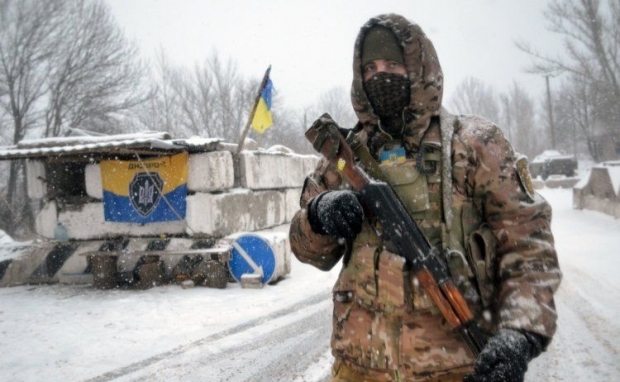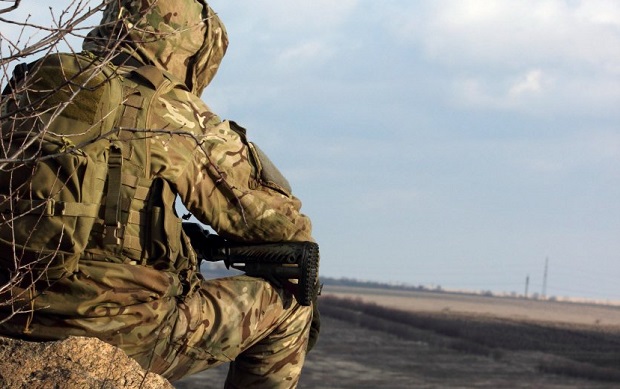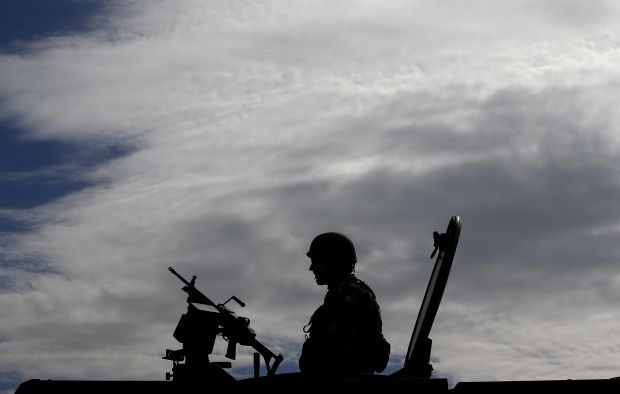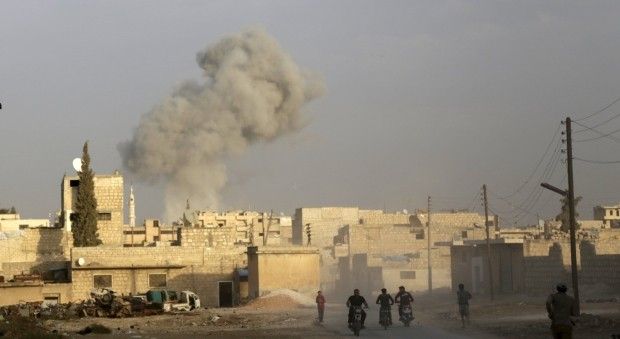
"Russia's dirty war in Ukraine is far from frozen, and despite the deteriorating situation, the West appears keen to turn a blind eye," editor at Interpreter Magazine Pierre Vaux wrote in an article titled "The War in Ukraine Is Back—So Why Won't Anyone Say So?" published by The Daily Beast on Wednesday, February 3.
While the fighting in southeast Ukraine has rumbled on incessantly throughout the winter, inducing conflict fatigue and a drop in media coverage, the last weeks have seen a marked spike in the number of attacks.
Ukrainian officials are reporting up to 71 attacks a day, with most of the fighting concentrated around the separatist-held cities of Donetsk and Gorlovka [Horlivka in Ukrainian], as well as the countryside east of the Azov port city of Mariupol.
Both sides accuse each other of daily using heavy mortars, which were supposed to have been withdrawn in accordance over a year ago in accordance with the first Minsk agreement.
According to the Organization for Security and Cooperation in Europe (OSCE), which monitors the ceasefire, this month saw the return of the use of Grad multiple-launch rocket systems and 152 mm artillery. Both were reportedly used on two consecutive days in separatist-held Gorlovka.
January 26 and 27 saw a multitude of reports from Donetsk residents on social media of intense fighting in the north of the city, where the front line runs alongside the ruins of the airport and the suburbs of Peski [Pisky in Ukrainian] and Avdeyevka [Avdiyivka in Ukrainian]. Dozens of Twitter and VKontakte (Russia's Facebook equivalent) users across the city reported a powerful explosion and shockwave on the 27th, for which there is still no credible explanation. Some users claimed that the shelling was the heaviest heard since the final assault on Donetsk Airport at this time last year.
Furthermore, over the last few days, we have seen the targeting of frontier checkpoints, which allow civilians to enter and leave separatist-held territory, by Russian-backed fighters, raising the possibility that the government may be forced to close these vital passages to avoid casualties.
The January 13 call, put forth by the new Russian representative at the Minsk peace talks, Boris Gryzlov, for an immediate, total ceasefire has clearly amounted to nothing.
The Ukrainian and separatist leaderships are pursuing diametrically opposed plans regarding the holding of local elections in the occupied regions of Donbas—a key element of the Minsk cease-fire agreements.
While Kyiv, and the text of the Minsk deal itself, says the elections must be held in accordance with Ukrainian law, Aleksandr Zakharchenko, the leader of the self-declared Donetsk People's Republic (DNR), last week restated his commitment to barring all major Ukrainian political parties and conducting the votes under DNR 'law.'

The prospects for another element of the Minsk process—the exchange of prisoners of war, are looking gloomy too. On January 28 the head of the International Committee of the Red Cross (ICRC) delegation to Ukraine, Alain Aeschlimann, told reporters that his organization had been allowed access to only four of the 133 Ukrainian prisoners the separatists claim to hold.
On January 25 former President Leonid Kuchma, the lead Ukrainian negotiator in direct talks with the Russian-backed separatists, said that he now thinks that many of those prisoners are already dead. The separatists are, he suggested, using the negotiations over the number of prisoners to stall and buy time.
All this comes amidst a grim backdrop. The ICRC says that over a thousand people are still missing as a result of the conflict in Donbas, and disease, fostered by a breakdown in infrastructure and thousands of casualties caused by the fighting, is spreading rapidly.
Ukraine (as well as southern Russia) is now in the grips of an epidemic of H1N1 variant flu, which has infected 18 regions of the country and killed at least 171 people. Schools have been closed indefinitely in Kharkiv. In separatist-held Donetsk, well over 2,000 people have turned to doctors with complaints of viral respiratory infections so far this year. The sister Luhansk "People's Republic" reports an even worse situation, with more than 10,000 people infected and dozens of quarantine zones introduced. Both Eduard Basurin, a DNR military spokesman, and Vadim Solovyov, an MP in the Russian State Duma, have claimed that the flu outbreak in Ukraine originated from an American biological warfare facility in government-controlled Kharkiv.
This of course, combined with a (most likely Russian) cyber attack that caused a blackout late last year and the stand-off at the frontier with occupied Crimea over imports, only adds to the deep-seated mistrust between Kyiv and the Russian side.
Yet on January 22, U.S. Secretary of State John Kerry said that sanctions on Russia could be lifted within "these next months" if the Minsk agreements were implemented in full.
Leaving aside the fact that sanctions were first introduced in response to Russia's occupation and annexation of Crimea—a completely separate issue on which there is not even a hint of progress, Kerry's suggestion that Minsk could be fully realized in the space of a few months is absurd.
Poroshenko has said that there must be a ceasefire before the "special status" law, that would establish semi-autonomy for the occupied areas of Donbas and establish the legal framework for local elections, comes into effect. And even if those highly contested electoral plans come to fruition, the Minsk agreements stipulate the withdrawal of all foreign (i.e. Russian) forces from Ukraine and the return of government control of all of the border with Russia before full implementation looks near.
Kerry's hint at rapprochement is part of a wider trend.
The German and Finnish governments continue to pursue the Nord Stream 2 pipeline project with the Russian state gas monopoly Gazprom, a policy that flies in the face of moves to achieve European energy independence and is opposed by Ukraine, Poland and the Baltic states.
In the U.K., despite a devastating conclusion from the public inquiry into the murder of Alexander Litvinenko, which found that the Russian Federal Security Service (FSB) had organized the radiological assassination, and that then FSB chief Nikolai Patrushev and even President Vladimir Putin himself had "probably" ordered it, the government has refrained from rocking the boat.
During the House of Commons debate that followed the publication of the Litvinenko Inquiry report, the home secretary, Theresa May, opposed calls from across the house for the introduction of a British equivalent to the U.S. Magnitsky Act — a broad sanctions bill aimed at corrupt and human rights-abusing Russian officials — and announced little more than the lukewarm punitive measure of freezing any UK assets belonging to the two assassins, who have been living under Kremlin protection (one as an MP) for almost a decade since the murder.

The reason for both Kerry and May's soft approach to Russia derives from Western hopes that Putin will be of assistance in Syria. "We will continue to call on President Putin for Russia, as one of the five permanent members of the United Nations Security Council, to engage responsibly and make a positive contribution to global security and stability," May said. "They can, for example, play an important role in defeating [ISIS] and, together with the wider international community, help Syria work towards a stable future."
But this means turning a blind eye not only to the killing of Litvinenko, but Russia's annexation of Crimea and invasion of Donbas for the sake of a hope that Putin may be turned to work with the West on Syria. If Russia can, with impunity, use radioactive polonium to murder a British citizen in London or shoot down a passenger airliner over Ukraine, then how can we collaborate on "serious crime" or "aviation security?"
The hope here is profoundly misplaced.
While Russia "could" play an important role in fighting ISIS, they are not and have used the cover story of doing so to further aims that run directly contrary to the (publicly stated, at least) aims of the U.K., U.S. and France. The vast majority of Russian air strikes in Syria are aimed not at ISIS-held territory, but areas controlled by opposition groups. This includes U.S.-supplied Free Syrian Army units. When they do carry out strikes in ISIS-held land, they bomb water treatment plants and grain silos, which the Russian Ministry of Defense attempts to pass off as oil refineries. Meanwhile, there are reports that Russia actually spent the years prior to the direct military intervention last September dispatching domestic jihadists to wage war in Syria with groups including ISIS itself.
The worst effect of this is that by devastating the opposition, which includes both nationalists and Islamists of shades varying from moderate to the fundamentalist, while leaving ISIS relatively unscathed, Putin and Bashar al-Assad are ensuring that the moderates are squeezed out and the jihadists' appeal to bombed and abused Sunnis is strengthened.

Furthermore, if the Assad regime succeeds, with the help of Russian air and ground forces, in retaking rebel-held areas like Idlib and Aleppo, then the refugee crisis that is already causing a breakdown in the EU Schengen system of free movement will worsen dramatically.
It is by no means a stretch to say that the breakup of the European Union is a foreign policy goal for the Kremlin. Russia has fostered relationships with far-right Eurosceptic parties across the EU, with the virulent, neo-Vichyist Front National even receiving millions of euros from a Kremlin-linked Russian bank. This month has even seen Russian state TV spreading a fabricated story of a German teenager being gang-raped by immigrants and the Russian embassy in London posting starkly racist tweets about Germany being trampled beneath the feet of migrants.
Western governments now appear set to ignore Russian malfeasance, not only in Ukraine and Syria, but at home in the EU, for the sake of fantasy and financial gain.

